
Playwright Branden Jacobs-Jenkins resurrects and reimagines a creaky pre-Civil War melodrama in his adventurous, genre-bending, meta-theatrical 2014 Obie Award winner An Octoroon, not only a long-awaited Fountain Theatre Los Angeles Premiere but a much-anticipated return to live, in-person play-going on the Fountain’s newly constructed open air stage.
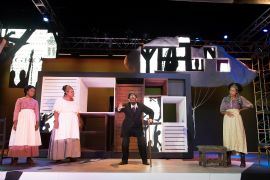 The 152-year-old melodrama in question is Dion Boucicault’s The Octoroon, whose 1859 debut production must have taken New York City by storm with its turgid tale of the 1/8th-black title character, desired by both the dashingly handsome young plantation owner George Peyton and the plantation’s horrifically dastardly overseer Jacob McClosky, yet doomed by her “tainted” blood to a tragic end that must have had Northerners up-in-arms about the evils of slavery as they wiped tears from their eyes at the utter tragedy of it all.
The 152-year-old melodrama in question is Dion Boucicault’s The Octoroon, whose 1859 debut production must have taken New York City by storm with its turgid tale of the 1/8th-black title character, desired by both the dashingly handsome young plantation owner George Peyton and the plantation’s horrifically dastardly overseer Jacob McClosky, yet doomed by her “tainted” blood to a tragic end that must have had Northerners up-in-arms about the evils of slavery as they wiped tears from their eyes at the utter tragedy of it all.
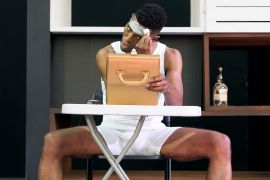 In other words, a play unlikely to inspire a 21st-century revival despite apparently being a favorite of Jacobs-Jenkins, whose alter ego BJJ (Matthew Hancock) opens this slightly retitled adaptation of Boucicault’s old chestnut with a long comedic riff on his own life and career (“I’m a ‘black playwright’,” he tells us, “whatever that means.’”) along with the reason he’s putting on whiteface for An Octoroon. (It turns out the Caucasian actors he’d originally cast all dropped out, reluctant to play unapologetic, or at least unwoke, racists.)
In other words, a play unlikely to inspire a 21st-century revival despite apparently being a favorite of Jacobs-Jenkins, whose alter ego BJJ (Matthew Hancock) opens this slightly retitled adaptation of Boucicault’s old chestnut with a long comedic riff on his own life and career (“I’m a ‘black playwright’,” he tells us, “whatever that means.’”) along with the reason he’s putting on whiteface for An Octoroon. (It turns out the Caucasian actors he’d originally cast all dropped out, reluctant to play unapologetic, or at least unwoke, racists.)
It’s during this opening salvo that none other than Dion Boucicault himself (Rob Nagle) stumbles onto the stage with drunken taunts and a hilarious reprise of the mirror routine originated by Harpo and Groucho Marx and reprised here with playwright facing playwright.
And this is merely the prelude to the late-1850s play BJJ is reviving, albeit not quite as Boucicault had intended.
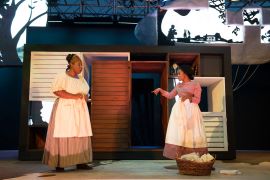 The 19th-century playwright could never have imagined, for instance, that slaves Dido (Kacie Rogers) and Minnie (Pam Trotter) would be shooting the breeze like a couple of contemporary bffs (“I met him and Darnell through her at a slave mixer over by the river before she dumped him because, you know, she couldn’t deal with the long-distance”).
The 19th-century playwright could never have imagined, for instance, that slaves Dido (Kacie Rogers) and Minnie (Pam Trotter) would be shooting the breeze like a couple of contemporary bffs (“I met him and Darnell through her at a slave mixer over by the river before she dumped him because, you know, she couldn’t deal with the long-distance”).
Alongside this slangy Dido-Minnie chitchat, Jacobs-Jenkins includes big chunks of the Boucicault original, with performances heightened precisely as they must have been a hundred-fifty years ago when there was no such thing as naturalistic or method acting.
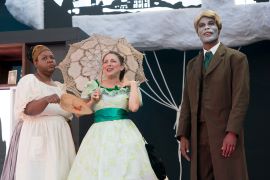 It’s at this point that we’re introduced to noble hero George and evil villain “M’Closky” (both played in whiteface by Hancock’s BJJ), Native American Wahnotee (Nagle in redface), wealthy Southern belle Dora (Vanessa Claire Stewart), and “octoroon” Zoe (Mara Klein), educated in Europe yet never allowed to forget that her “mixed blood” makes her a societal outcast.
It’s at this point that we’re introduced to noble hero George and evil villain “M’Closky” (both played in whiteface by Hancock’s BJJ), Native American Wahnotee (Nagle in redface), wealthy Southern belle Dora (Vanessa Claire Stewart), and “octoroon” Zoe (Mara Klein), educated in Europe yet never allowed to forget that her “mixed blood” makes her a societal outcast.
Completing the cast of characters are elderly slave Pete and “pickaninny” slave boy Paul (both played by Hazel Lozano as Boucicault’s assistant), pregnant slave Grace (Leea Ayers), assorted minor players, and Br’er Rabbit (Ayers), the iconic Uncle Remus trickster popping in as a sort of deus ex machina from time to time.
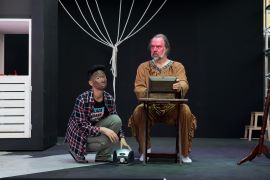 Taking abundant risks along the way (including genre mixing, an entire act described rather than enacted, and at least one shocking black-and-white reminder of what awaited a person of color who dared disobey societal rules), Jacobs-Jenkins isn’t afraid to provoke as much discomfort as laughter, particularly when the audience is about 98% white, as it was at Sunday’s performance.
Taking abundant risks along the way (including genre mixing, an entire act described rather than enacted, and at least one shocking black-and-white reminder of what awaited a person of color who dared disobey societal rules), Jacobs-Jenkins isn’t afraid to provoke as much discomfort as laughter, particularly when the audience is about 98% white, as it was at Sunday’s performance.
Under Judith Moreland’s endlessly imaginative direction, the entire cast soars, from Hancock’s magnificently magnetic star turn in multiple roles to the always commanding Nagle’s droll trio of characters (he’s auctioneer Lafouche as well) to Rogers’ and Trotter’s sensationally sassy Dido and Minnie, to a delightfully gender-bending Lozano’s Assistant, Pete, and Paul, to Stewart’s spirited, spoofy take on Scarlett O’Hara to Ayers’ terrific twin turns as Grace and Br’er Rabbit, with Klein meriting special snaps for her heartbreakingly real Zoe, whose authenticity stands in deliberately marked contrast to the heightened reality that surrounds her.
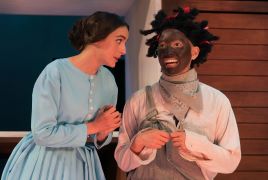 Not surprisingly for a Fountain Theatre production, scenic designer Frederica Nascimento, video designer Nicholas Santiago, lighting designer Derrick McDaniel, properties designer Michael Allen Angel, costume designer Naila Aladdin-Sanders, and composer-sound designer Marc Antonio Pritchett deliver the production-design goods every step of the way, Annie Yee’s choreography is striking as is Pritchett’s choice of dance-club-ready hip-hop tunes, and fight choreographer Jen Albert outdoes herself in a mano-a-mano between George and M’Closky that proves a Hancock-vs.-Hancock tour de force.
Not surprisingly for a Fountain Theatre production, scenic designer Frederica Nascimento, video designer Nicholas Santiago, lighting designer Derrick McDaniel, properties designer Michael Allen Angel, costume designer Naila Aladdin-Sanders, and composer-sound designer Marc Antonio Pritchett deliver the production-design goods every step of the way, Annie Yee’s choreography is striking as is Pritchett’s choice of dance-club-ready hip-hop tunes, and fight choreographer Jen Albert outdoes herself in a mano-a-mano between George and M’Closky that proves a Hancock-vs.-Hancock tour de force.
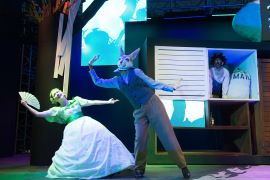 Additional program credits are shared by Scott Tuomey (technical director), Noele Kyle Cunanan (audio engineer), Terri Roberts (costume maintenance), and Daphne Sicre Ph.D (dramaturg).
Additional program credits are shared by Scott Tuomey (technical director), Noele Kyle Cunanan (audio engineer), Terri Roberts (costume maintenance), and Daphne Sicre Ph.D (dramaturg).
An Octoroon is produced by Stephen Sachs, Simon Levy, and James Bennett. Barbara Herman and Susan Stockel are executive producers. Deena Tovar is production stage manager, Quinn O’Connor is assistant stage manager and Shawna Voragen is outdoor stage production manager. Lucy Pollak is publicist.
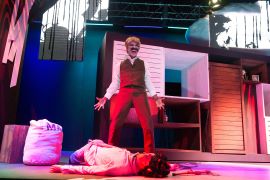 Every bit as brilliant and button-pushing as the two previous Jacobs-Jenkins plays I’ve reviewed, An Octoroon may well make you uncomfortable, but it’s the best kind of discomfort, the kind that makes you think, just one reason why the Fountain’s latest looks to be the summer’s most talked (and raved) about production, not to mention the hottest ticket in town.
Every bit as brilliant and button-pushing as the two previous Jacobs-Jenkins plays I’ve reviewed, An Octoroon may well make you uncomfortable, but it’s the best kind of discomfort, the kind that makes you think, just one reason why the Fountain’s latest looks to be the summer’s most talked (and raved) about production, not to mention the hottest ticket in town.
The Fountain Theatre, 5060 Fountain Ave., Los Angeles.
www.FountainTheatre.com
–Steven Stanley
June 27, 2021
Photos: Jenny Graham
Tags: Branden Jacobs-Jenkins, Fountain Theatre, Los Angeles Theater Review


 Since 2007, Steven Stanley's StageSceneLA.com has spotlighted the best in Southern California theater via reviews, interviews, and its annual StageSceneLA Scenies.
Since 2007, Steven Stanley's StageSceneLA.com has spotlighted the best in Southern California theater via reviews, interviews, and its annual StageSceneLA Scenies.







 COPYRIGHT 2025 STEVEN STANLEY :: DESIGN BY
COPYRIGHT 2025 STEVEN STANLEY :: DESIGN BY